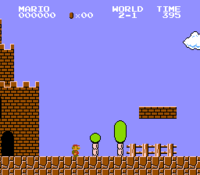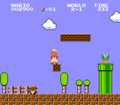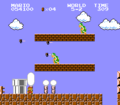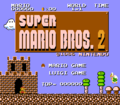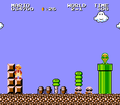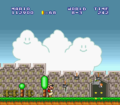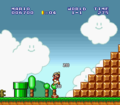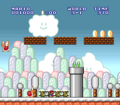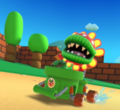Horsetail
| Horsetail | |
|---|---|
| The Thousand-Year Door description | A plant found in Petal Meadows. Replenishes 3 HP. |
| Super Paper Mario description | A spring reed that restores 7 HP and cures poison. |
Horsetails are a cooking ingredient in Paper Mario: The Thousand-Year Door and Super Paper Mario, which additionally appear as background objects with minor plot importance in Super Mario Bros.
History
Super Mario Bros. / Super Mario Bros.: The Lost Levels
According to the original manual for Super Mario Bros., Bowser turned the citizens of the Mushroom Kingdom into horsetail plants and bricks. However, the English manual renders this as "field horsehair plants".[1] They are the ovoid tree-like plants seen throughout the game[2] (specifically, Worlds 2, 3, 5, 7, and 8), which come in two sizes, and depending on the level's palette, can be either green or white (in Super Mario All-Stars, the white ones' appearance is due to snow), with both having a tan segmented stem. These plants are also seen in Super Mario Bros.: The Lost Levels (specifically, the odd-numbered and -lettered worlds), where they are now segmented themselves and have eyes; additionally, the ones in World A-1 appear in orange (but not in All-Stars). They also appear in several other games borrowing graphics from or basing certain stages on Super Mario Bros.; for example, in Super Mario Maker, horsetails occasionally pop up in the ground theme in the Super Mario Bros. style when placing ground tiles.
Paper Mario series
Paper Mario: The Thousand-Year Door
In Paper Mario: The Thousand-Year Door, Horsetails are items that heal 3 HP. They are found in an area of Petal Meadows. Just before reaching the area with the bridge, coming from the Rogueport pipe, there is a Candy Pop that, when hit with a hammer, sinks down and bounces back up. After hitting the cane 10 times, a Horsetail comes out. This can be done several times, after exiting and re-entering the area.
Super Paper Mario
In Super Paper Mario, Horsetails are items that restore 7 HP and cures poison. They are usually dropped by Putrid Piranhas. They can also be bought in the Itty Bits in The Dotwood Tree for 18 coins.
Other appearances
As part of the course's "retro" aesthetic, horsetails appear in the final turn of Piranha Plant Slide in Mario Kart 7. They are replaced with standard trees in the course's reappearance in Mario Kart 8 and Mario Kart 8 Deluxe, though they return to the course in Mario Kart Tour.
Recipes
| Recipe | Result | Game |
|---|---|---|
| Horsetail + Mystic Egg | Omelette Plate | Paper Mario: The Thousand-Year Door |
| Horsetail + Mushroom | Zess Dinner | |
| Horsetail + Super Mushroom | ||
| Horsetail + Life Mushroom | ||
| Horsetail + Ultra Mushroom | Zess Special | |
| Horsetail + Turtley Leaf | Healthy Salad | |
| Horsetail | Roast Horsetail | Super Paper Mario |
| Horsetail + Cake Mix | Horsetail Tart | |
| Horsetail + Big Egg | Omelette Plate | |
| Horsetail + Turtley Leaf | Koopa Pilaf |
Gallery
Super Mario Bros. Special (PC-88)
Names in other languages
| Language | Name | Meaning | Notes |
|---|---|---|---|
| Japanese | つくし[3] Tsukushi |
Horsetail | |
| つくしんぼ[?] Tsukushinbo |
From「土筆」(tsukushi, "horsetail") and possibly the affectionate suffix「~んぼ」(-nbo) | Paper Mario series | |
| Chinese (simplified) | 马尾草[?] Mǎwěi Cǎo |
Horsetail | |
| Chinese (traditional) | 馬尾草[?] Mǎwěi Cǎo |
Horsetail | |
| French | Prêle[?] | Horsetail | |
| German | Wurzel[?] | Root | |
| Italian | Erba cavallina[4] | Horse grass | Super Mario Bros. |
| Coda cavallina[?] | Horsetail | Paper Mario item | |
| Korean | 쇠뜨기[?] Soetteugi |
Horsetail | |
| Spanish | Cola de Caballo[?] | Horsetail |
References
- ^ Legends of Localization comparing the Japanese and North American storylines of Super Mario Bros.
- ^ Sase, Shinji, Howard Phillips, and Lynn Griffes, editors (1987). How to win at Super Mario Bros. (U.S. Edition). Redmond: Tokuma Shoten, Nintendo of America. ISBN 4-19-720003-XC. Page 6.
- ^ Super Mario Bros. Japanese instruction booklet. Page 4.
- ^ Super Mario Bros. Italian instruction booklet. Page 2.
| Super Mario Bros. Special | |
|---|---|
| Protagonists | Mario • Mushroom retainer • Princess Peach |
| Worlds | World 1 • World 2 • World 3 • World 4 • World 5 • World 6 • World 7 • World 8 |
| Items | 1 up Mushroom • Clock • Coin • Fire Flower • Hachisuke • Hummer • Lucky Star • Magic Mushroom • Starman • Wing |
| Enemies | Bloober • Bullet Bill • Buzzy Beetle • Cheep-cheep • Chokichoki • Fire-Bar • Hammer Brother • Koopa Paratroopa • Koopa Troopa • Lakitu • Little Goomba • Nakaji • Piranha Plant • Podoboo • Sigebou • Spiny • Spiny's egg • Tarusar • Tsurara • Turtle Cannon |
| Boss | Bowser |
| Miscellaneous | Ax • Beanstalk • Coin Heaven • Coral • Fireworks • Flagpole • Horsehair plant • Jumping board |
